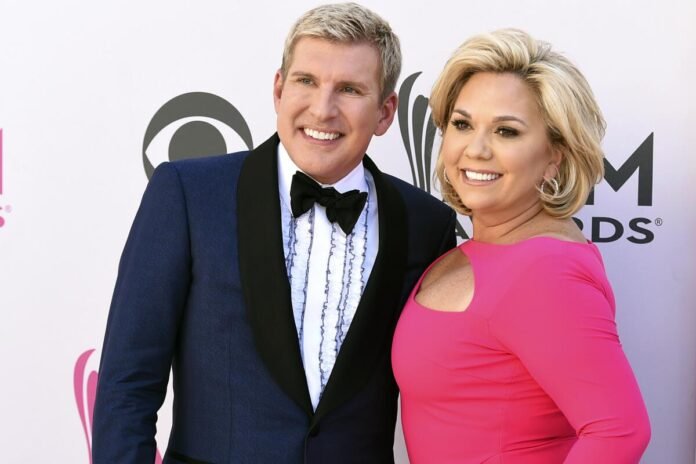On May 27, 2025, the White House confirmed that President Donald Trump had granted full pardons to reality TV stars Todd and Julie Chrisley, who were serving lengthy prison sentences for bank fraud and tax evasion. This move, which immediately sparked headlines and debate, left many Americans asking a simple question: Why did Trump pardon the Chrisley? Let’s break down the latest developments, the motivations behind the pardon, and what this means for the Chrisley family and the broader conversation about presidential clemency.
The Latest: Trump Pardons Reality TV’s Chrisley Couple
The most recent news about the Chrisleys is nothing short of dramatic. Todd Chrisley, sentenced to 12 years, and Julie Chrisley, sentenced to seven years, were both convicted in 2022 for orchestrating a scheme that defrauded banks out of more than $36 million and for multiple tax offenses. Despite their convictions, the Chrisleys maintained their innocence and appealed their sentences, with their daughter, Savannah Chrisley, leading a high-profile campaign for their release.
On Tuesday, May 27, President Trump personally called Savannah and her brother from the Oval Office, informing them of his intention to pardon their parents. The news was shared in a video posted by Trump’s adviser, Margo Martin, and quickly went viral across social media and news outlets. Trump expressed sympathy for the family, saying, “It’s a terrible thing, but it’s a wonderful thing because your parents are going to be free and clear.” The pardons are expected to be finalized within days, marking one of the most high-profile clemency actions of Trump’s second term.
Why Did Trump Pardon the Chrisley? Political and Personal Motivations
The Chrisleys’ Campaign for Clemency
The question “why did Trump pardon the Chrisley” cannot be answered without looking at the family’s persistent public campaign. Savannah Chrisley became a vocal advocate, appearing on conservative talk shows, speaking at the 2024 Republican National Convention, and even visiting the White House earlier this year. She argued that her parents were unfairly targeted and received sentences that were too harsh. Her advocacy caught the attention of Trump’s inner circle, including Alice Johnson, Trump’s “pardon czar,” who herself received a pardon from Trump during his first term.
Trump’s Approach to Pardons
President Trump’s use of the pardon power has been unconventional and, at times, controversial. Since returning to office, he has issued a string of high-profile pardons, particularly for individuals convicted of white-collar crimes. Trump’s clemency actions often bypass the traditional Department of Justice review process, relying instead on personal appeals, political connections, and public campaigns.
In the Chrisleys’ case, several factors likely influenced Trump’s decision:
- Media Visibility: The Chrisleys’ fame from their reality show “Chrisley Knows Best” and Savannah’s active media presence made their case highly visible.
- Political Support: Savannah’s public support for Trump, including her speech at the Republican National Convention, may have helped their cause.
- Narrative of Overreach: Trump and his advisers have repeatedly framed many of his pardons as corrections of what they see as excessive or politically motivated prosecutions, especially under previous administrations.
- Personal Appeals: Direct outreach from the Chrisley family and their supporters, including meetings at the White House, played a significant role.
The Broader Context
Trump’s recent pardons, including the Chrisleys’, reflect a broader trend in his approach to executive clemency. He has granted pardons to several individuals convicted of financial crimes, often citing claims of unfair prosecution or excessive sentencing. Critics argue that this approach undermines the justice system and favors those with fame or political connections, while supporters claim it brings needed attention to prosecutorial overreach.
What the Chrisley Pardon Means for Criminal Justice and Reality TV
Immediate Impact on the Chrisley Family
With the pardons, Todd and Julie Chrisley are expected to be released from prison within days. Their convictions for fraud and tax evasion will be wiped clean, allowing them to resume their lives and potentially return to television. Savannah Chrisley, who has been the public face of her family’s campaign, expressed disbelief and gratitude, stating, “I still don’t believe it’s real.”
Implications for Presidential Pardons
The Chrisley pardon is part of a pattern in Trump’s second term, where the pardon power has become more personalized and politically charged. The process, once handled largely by career officials in the Justice Department, now often resides in the White House and is influenced by direct appeals and media campaigns. This shift has led to increased scrutiny and calls for reform of the clemency process.
Key Points at a Glance
- Todd and Julie Chrisley were convicted in 2022 for defrauding banks and tax evasion.
- President Trump announced their pardons on May 27, 2025, after a high-profile campaign led by their daughter, Savannah.
- The decision reflects Trump’s broader use of the pardon power to address what he and his supporters see as unjust or excessive prosecutions.
- The Chrisleys are expected to be released from prison imminently, with their records cleared.
The Future: Will the Chrisleys Return to TV?
With their legal troubles behind them, speculation is already swirling about a possible return to reality television for the Chrisley family. Their story—a dramatic fall from grace followed by a presidential pardon—seems tailor-made for a comeback. Whether or not they return to the spotlight, the Chrisleys’ case will remain a symbol of the evolving use of presidential clemency in American politics.
